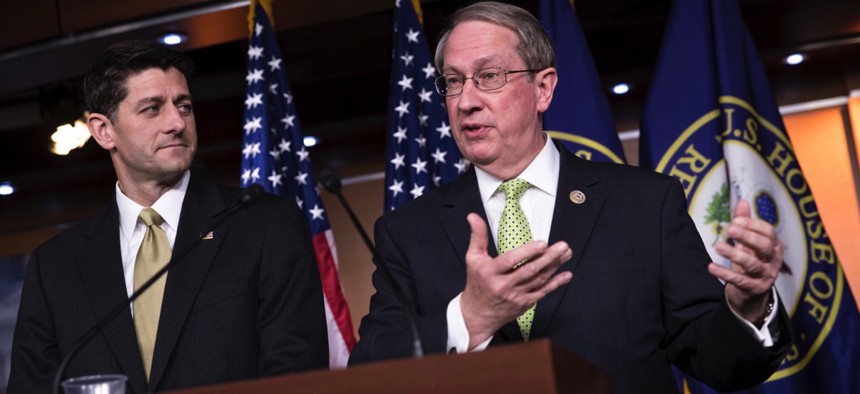Despite Opposition From Mayors and Police, U.S. House Looks to Punish ‘Sanctuary Cities’

House Speaker Paul Ryan, R-Wis., left, and House Judiciary Committee Chairman Bob Goodlatte, R-Va., right. J. Scott Applewhite / AP Photo
“Many departments have such policies to encourage crime victims and witnesses to report crimes and to build trust with immigrant communities,” wrote New Orleans Mayor Mitch Landrieu in a letter to representatives.
WASHINGTON — U.S. House Republicans pushed through a pair of bills opposed by mayors and police chiefs Thursday that would restrict certain federal grants to sanctuary cities and increase potential penalties on undocumented immigrants who repeatedly enter the U.S.
The No Sanctuary for Criminals Act, H.R. 3003, passed 228-195 and Kate’s Law—named for 32-year-old Kate Steinle, who was shot and killed by previously deported undocumented immigrant Francisco Sanchez in 2015 in San Francisco—passed 257-167, mostly along party lines.
Both pieces of legislation were closed rules, unavailable to amendment, proposed by U.S. Rep. Bob Goodlatte, a Virginia Republican.
“We’re making the streets safer, and law enforcement knows it,” he said, prior to floor debate. “And if you talk to individual law enforcement officers, you’re going to find overwhelmingly they support having better cooperation here between the state, federal and local law enforcement agencies.”
New Orleans Mayor Mitch Landrieu, president of the bipartisan U.S. Conference of Mayors, disagreed in a letter to the House, writing H.R. 3003 would “jeopardize public safety, preempt local authority, and expose local governments to litigation.” The conference argues compliance with Immigration and Customs Enforcement detainer requests for undocumented immigrants, without warrants, violates the Fourth Amendment.
Mayors and the Major Cities Chiefs Association agree Congress should instead be strengthening bonds between communities and police while pursuing comprehensive immigration reform, Landrieu wrote. U.S. Rep. Zoe Lofgren, a California Democrat, cited the Fraternal Order of Police, 36 sheriffs and police chiefs on the Law Enforcement Task Force, Major County Sheriffs of America, National Task Force to End Sexual and Domestic Violence, National League of Cities, and National Association of Counties all against H.R. 3003.
“It would jeopardize public safety by withholding critical public safety funding from jurisdictions that tell their police officers not to ask an individual their immigration status,” Landrieu wrote. “Many departments have such policies to encourage crime victims and witnesses to report crimes and to build trust with immigrant communities.”
The federal funding in question is Department of Justice and Department of Homeland Security grants, the withholding of which could violate the 10th Amendment, Landrieu wrote.
Homeland Security Secretary John Kelly expressed White House support for both H.R. 3003 and H.R. 3004 ahead of the votes, arguing sanctuary cities undermine federal law enforcement and cause ICE to run “targeted operations” into neighborhoods and businesses. So far in 2017, ICE has made 32,700 criminal arrests, Kelly said.
“It is beyond my comprehension why federal, state and local officials sworn to enforce the laws of the nation, as I am, would actively discourage or outright prevent law enforcement agencies from upholding the laws of the United States and why they would set public funds aside to pay for the legal representation of illegal aliens who are also lawbreakers,” Kelly said. “In doing so they prioritize criminals over public and law enforcement officer safety.”
Los Angeles, New York City, San Francisco and Seattle are among the cities that have created legal defense funds for immigrants facing deportation, holding those with attorneys are seven times more likely to be permitted to remain in the country.
Goodlatte and House Speaker Paul Ryan, a Wisconsin Republican, urged the Senate to act on both bills “promptly,” while Democrats criticized the expedited process.
“This is the 38th closed rule allowing no amendments that House Republicans have brought to the floor this year alone, and it’s only June,” said Louise Slaughter, a New York Democrat. “At this rate, the majority is on its way to becoming the most closed Congress in history.”
Passage of either piece of legislation by the GOP-controlled Senate is dubious considering similar versions of both died there last year with Democrats holding less seats.
“We’re trying to solve crimes by seeking cooperation from the immigrant community. This bill will make it harder,” said U.S. Rep. Gerry Connolly, a Virginia Democrat and former Fairfax County supervisor of 13 years. “Most of our local police chiefs would tell you that if you’d listen to them.”
Dave Nyczepir is a News Editor at Government Executive’s Route Fifty and is based in Washington, D.C.
NEXT STORY: Why Wednesday’s ‘Election Integrity’ Actions Should Be Watched By States






